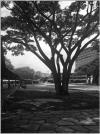Abstract
One of the fundamental studies to carry out a comprehensive approach of management of heritage green areas is its historicalreview. It lets us know how they were conceived, designed and developed over time. This paper will be devoted to studythe landscaping of Caracas University Campus, in the original project of Carlos Raúl Villanueva, with the purpose of building asustainable approach to the management of these outdoor areas.The paper is based on the guidelines of the Environmental Approach and the use of hermeneutical tools that offer us the opportunityto study and interpret comprehensively the outdoor areas of Caracas University Campus. Texts written and lecturesgiven by Carlos Raúl Villanueva were researched, as well as his insights on cities and nature. Charts, photographic records andinterviews to key people involved in the process of designing the campus were also reviewed.The results of this research confirm the landscape guidelines of Carlos Raúl Villanueva, with the finding of some of his hithertounknown plans. As a result of this work, the comprehensive management of Caracas University Campus landscaping is reinforced;this allows to make the current adaptations based on the project designed by Carlos Raúl Villanueva at the middle ofthe twentieth century.Apuntes is registered under a Creative Commons Attribution 4.0 International Public License. Thus, this work may be reproduced, distributed, and publicly shared in digital format, as long as the names of the authors and Pontificia Universidad Javeriana are acknowledged. Others are allowed to quote, adapt, transform, auto-archive, republish, and create based on this material, for any purpose (even commercial ones), provided the authorship is duly acknowledged, a link to the original work is provided, and it is specified if changes have been made. Pontificia Universidad Javeriana does not hold the rights of published works and the authors are solely responsible for the contents of their works; they keep the moral, intellectual, privacy, and publicity rights.
Approving the intervention of the work (review, copy-editing, translation, layout) and the following outreach, are granted through an use license and not through an assignment of rights. This means the journal and Pontificia Universidad Javeriana cannot be held responsible for any ethical malpractice by the authors. As a consequence of the protection granted by the use license, the journal is not required to publish recantations or modify information already published, unless the errata stems from the editorial management process. Publishing contents in this journal does not generate royalties for contributors.


